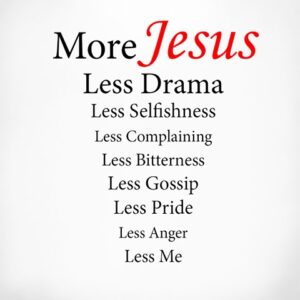
What happens when the Church gets distracted and Jesus is no longer the focus? Is the result a watered-down witness to the world?
Author and speaker Frank Viola once said, “I don’t think the Church has ADD — Attention Deficit Disorder. I think the Church has JDD — Jesus Deficit Disorder.”
We go to church. We sing songs. We hear a sermon, and we go home. Sometimes Jesus doesn’t even come up. How does that happen?
The Church has this remarkable ability to get distracted, and when we get distracted, everyone else gets distracted with us. So when the Church is distracted, not only does the Church suffer, but everyone else in our culture suffers, too.
Pastor Pete Briscoe gave this analogy at the National Religious Broadcasters convention in 2013;
“I was on a sailboat recently, and the guy who owned the boat asked me to steer. When I told him I didn’t know how, he assured me it was easy. I grabbed this big wheel. I was scared to death. Everything was coming from a million different directions. The waves were crashing against the side of the boat. I didn’t want to do something wrong and have someone fall off. I was so distracted by everything going on around me. I looked at him and said, “Help!”
And he said, “It’s so simple. Look across the lake. You see that water tower over there? Just aim for that water tower. Don’t take your eyes off it. And if you’ll do that, the sails will fill with wind, and we’ll be in good shape.”
As I followed his advice, people would try to talk to me, the wind would change direction, and the boat would start to shift, but I’d just get it going right at that water tower again. Each time, the sails filled with wind.”
It’s my contention that if we’re distracted – and I know a lot of us are – that we need to figure out what the water tower is. Don’t take our eyes off it, and let all the distractions fade away.
The question is, of course, what is the water tower? Scripture is clear that there’s only one answer.
The Apostle Paul is a hero of mine because he never got distracted. He was laser-focused on his water tower. In the second chapter of his letter to the Colossians, Paul said very clearly what was important to him.
Colossians 2:1-3 – “1For I want you to know what a great conflict I have for you and those in Laodicea, and for as many as have not seen my face in the flesh, 2that their hearts may be encouraged, being knit together in love, and attaining to all riches of the full assurance of understanding, to the knowledge of the mystery of God, both of the Father and of Christ, 3in whom are hidden all the treasures of wisdom and knowledge.”
That’s the water tower – the mystery of God. It isn’t like an Agatha Christie mystery we have to figure out and decipher. It’s something that God has known forever, that He has kept hidden for generations, but has revealed by the Spirit to the Apostle, so that He can communicate it to us.
The mystery is Christ – His person, His work on the cross and His resurrection. But it’s more than that. The mystery is the fact that this Christ, after He ascended into Heaven, comes to anyone who will bow to Him, and by His Spirit lives in them.
Paul writes in Galatians 2:20: “20I have been crucified with Christ; it is no longer I who live, but Christ lives in me; and the life which I now live in the flesh I live by faith in the Son of God, who loved me and gave Himself for me.” The indwelling Christ is the mystery, the water tower. We should never, ever take our eyes off it.
The sailboat is a beautiful analogy of the Christian life. When you point it at the water tower, the sails fill with wind. When we point our lives, our ministry, our church at Christ, the Spirit fills our sails, and not only do we greatly benefit, but everyone around us will as well.
The person of Jesus is increasingly politically incorrect, and is being replaced by the language of “justice,” “the kingdom of God,” “values,” and “leadership principles.” The testimony, that God has called us to bear, centers on the supremacy of the Lord Jesus Christ. Specifically . . .
- The center and circumference of the Christian life is none other than the person of Christ. All other things, including things related to him and about him, are eclipsed by the sight of his matchless worth. Knowing Christ is Eternal Life. And knowing him profoundly, deeply, is the chief pursuit of our lives, as it was for the first Christians. God is not so much about fixing things that have gone wrong in our lives as finding us in our brokenness and giving us Christ.
- Jesus Christ cannot be separated from his teachings. Aristotle says to his disciples, “Follow my teachings.” Socrates says to his disciples, “Follow my teachings.” Buddha says to his disciples, “Follow my meditations.” Confucius says to his disciples, “Follow my sayings.” Muhammad says to his disciples, “Follow my noble pillars.” Jesus says to his disciples, “Follow me.” In all other religions, a follower can follow the teachings of its founder without having a relationship with that founder. Not so with Jesus Christ. The teachings of Jesus cannot be separated from Jesus himself. Jesus Christ is still alive and he embodies his teachings. It is a profound mistake, therefore, to treat Christ as simply the founder of a set of moral, ethical, or social teaching. The Lord Jesus and his teaching are one.
- The “Jesus of history” cannot be disconnected from the “Christ of faith.” The Jesus who walked the shores of Galilee is the same person who indwells the church today. There is no disconnect between the Jesus of Mark’s Gospel and the incredible, all-inclusive, cosmic Christ of Paul’s letter to the Colossians. The Christ who lived in the first century has a pre-existence before time. He also has a post-existence after time. He is Alpha and Omega, Beginning and End, A and Z, all at the same time. He stands in the future and at the end of time at the same moment that He indwells every believer.
- It’s possible to confuse “the cause” of Christ with the person of Christ. When the early church said “Jesus is Lord,” they did not mean “Jesus is my core value.” Jesus isn’t a cause; he is a real and living person who can be known, loved, and experienced. Focusing on his cause or mission doesn’t equate focusing on or following Him. Jesus led us to think of God differently, as relationship.
- Jesus Christ was not a social activist or a moral philosopher. To pitch Him that way is to drain His glory and dilute His excellence. Justice apart from Christ is a dead thing. The only battering ram that can storm the gates of hell is not the cry of Justice, but the name of Jesus. Jesus Christ is the embodiment of Justice, Peace, Holiness, Righteousness. He is the sum of all spiritual things. When Jesus becomes an abstraction, faith loses its reproductive power. Jesus did not come to make bad people good. He came to make dead people live.
- It is possible to confuse an academic knowledge or theology about Jesus with a personal knowledge of the living Christ himself. These two stand as far apart as do the hundred thousand million galaxies. The fullness of Christ can never be accessed through the frontal lobe alone. Christian faith claims to be rational, but also to reach out to touch ultimate mysteries. Jesus does not leave His disciples with CliffsNotes for a systematic theology. He leaves His disciples with breath and body. Jesus does not leave His disciples with a coherent and clear belief system by which to love God and others. Jesus gives His disciples wounds to touch and hands to heal. Jesus does not leave His disciples with intellectual belief or a “Christian worldview.” He leaves His disciples with a relational faith. Christians don’t follow a book. Christians follow a Person, and this library of divinely inspired books we call “The Holy Bible” best help us follow that Person. The Written Word is a map that leads us to The Living Word. Or as Jesus himself put it in John 5:39 “39You search the Scriptures, for in them you think you have eternal life; and these are they which testify of Me.” The Bible is not the destination; it’s a compass that points to Christ. The meaning of Christianity does not come from allegiance to complex theological doctrines, but a passionate love for a way of living in the world that revolves around following Jesus, who taught that love is what makes life a success . . . not wealth or health or anything else: but love. And God is love.
Over 300 years ago a German pastor wrote a hymn that is built around the Name above all names:
Ask Me What Great Things I Know
Baptist Hymn #282
Verse 1 – Ask you what great thing I know, that delights and stirs me so? What the high reward I win? Whose the name I glory in?
Jesus Christ, the crucified.
Verse 4 – This is that great thing I know; this delights and stirs me so: faith in Him who died to save, Him who triumphed o’er the grave:
Jesus Christ, the crucified.
- Christians don’t follow Christianity; Christians follow Christ.
- Christians don’t preach themselves; Christians proclaim Christ.
- Christians don’t point people to core values; Christians point people to the cross.
- Christians don’t preach about Christ: Christians preach Christ.
Jesus Christ – the crucified, resurrected, enthroned, triumphant, living Lord.



 In this season of uncertainty, I would like to express my heartfelt thanks to all of you who have “held the rope” with us for so long. At Orchard, we have had a monthly gathering of men for a long time called Hold The Rope. This is a gathering where the men of the church fellowship over a meal and spend time together as men. It has been on my heart for a while now, and thoughts about why do we call it Hold The Rope have been floating around my mind. I have been doing some reading. I came across this book by John Piper and I would like to share an excerpt from it. Mr. Piper shared in his book Andrew Fuller: Holy Faith, Worthy Gospel, World Mission, that the commitment (and the oath) to “hold the rope” was wonderfully demonstrated by a band of mission-minded pastors from the 1700’s. Here is an excerpt from John Piper’s book:
In this season of uncertainty, I would like to express my heartfelt thanks to all of you who have “held the rope” with us for so long. At Orchard, we have had a monthly gathering of men for a long time called Hold The Rope. This is a gathering where the men of the church fellowship over a meal and spend time together as men. It has been on my heart for a while now, and thoughts about why do we call it Hold The Rope have been floating around my mind. I have been doing some reading. I came across this book by John Piper and I would like to share an excerpt from it. Mr. Piper shared in his book Andrew Fuller: Holy Faith, Worthy Gospel, World Mission, that the commitment (and the oath) to “hold the rope” was wonderfully demonstrated by a band of mission-minded pastors from the 1700’s. Here is an excerpt from John Piper’s book: As this new year begins, it appears that this year won’t be any different that the last one, and that’s ok. Crazy, I know, but I have realized that we don’t need a new President to make everything better. We don’t need a Democrat or Republican to make all the sorrows of the world go away. What we need is more Jesus! Not just as a nation, but personally. If we have more and more and more Jesus, the rest of the world’s cares and concerns don’t have near as much of an impact. When you look back at His time here with us, you realize that He didn’t let the cares of this world cause Him stress. The reason He didn’t let stress get to Him sounds very simple, but it is powerful nonetheless. He knew who is in control of it all. He used the scriptures to demonstrate and show who controls all things. God is in control and none of what happened back when Jesus was on Earth or what is happening today has caught Him by surprise. The lyrics to an old song from my younger days keeps ringing through my head: “
As this new year begins, it appears that this year won’t be any different that the last one, and that’s ok. Crazy, I know, but I have realized that we don’t need a new President to make everything better. We don’t need a Democrat or Republican to make all the sorrows of the world go away. What we need is more Jesus! Not just as a nation, but personally. If we have more and more and more Jesus, the rest of the world’s cares and concerns don’t have near as much of an impact. When you look back at His time here with us, you realize that He didn’t let the cares of this world cause Him stress. The reason He didn’t let stress get to Him sounds very simple, but it is powerful nonetheless. He knew who is in control of it all. He used the scriptures to demonstrate and show who controls all things. God is in control and none of what happened back when Jesus was on Earth or what is happening today has caught Him by surprise. The lyrics to an old song from my younger days keeps ringing through my head: “ The election of the President has stirred up both anger and celebration. The media, both social and traditional, are fanning the flames on all sides. As a believer, I am finding it hard to watch or read. Much of what I see on social media is coming from “Christians”. Many are worrying about the outcome to the point of stressing themselves to a frenzy.
The election of the President has stirred up both anger and celebration. The media, both social and traditional, are fanning the flames on all sides. As a believer, I am finding it hard to watch or read. Much of what I see on social media is coming from “Christians”. Many are worrying about the outcome to the point of stressing themselves to a frenzy. Looking For The Light When All You See Is Darkness
Looking For The Light When All You See Is Darkness

